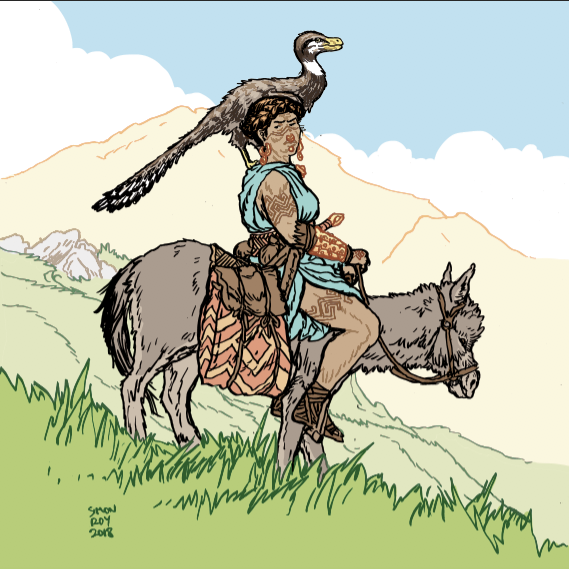
Joshua A.C. Newman (Shock: Social Science Fiction) is publishing his Bloody-Handed Hand of Bronze game with some very cool funky fantasy art by Shel Khan (By Crom! Six Ages) and Simon Roy (Prophet). Inspired by Conan, The Dying Earth and the Torah(!). https://www.kickstarter.com/projects/JoshuaACNewman/joshua-ac-newmans-bloody-handed-name-of-bronze?ref=nav_search&result=project&term=bloody%20hand

I’ve played this game a number of times and want this to fund. Ask me anything you might want to know about it.
I’ve played this game a number of times and want this to fund. Ask me anything you might want to know about it.
In case you are interested, here’s a session of the game with Vincent Baker (Warning, it’s extremely rad): https://live.kickstarter.com/joshua-a-c–newman/live-stream/vincent-baker-and-joshua-a-c–newman-get-their-hands-bloody
And also the interview I did with Joshua if case you want to learn more about the logic and meaning behind the game: youtube.com – Story Always Episode 15: interview with Joshua A.C. Newman
In case you are interested, here’s a session of the game with Vincent Baker (Warning, it’s extremely rad): https://live.kickstarter.com/joshua-a-c–newman/live-stream/vincent-baker-and-joshua-a-c–newman-get-their-hands-bloody
And also the interview I did with Joshua if case you want to learn more about the logic and meaning behind the game: youtube.com – Story Always Episode 15: interview with Joshua A.C. Newman
…and if anyone has questions, I’m right here!
…and if anyone has questions, I’m right here!
From a quick look at the preview, I can’t figure out the basics of game play. How do I and other players start to play? Do we make characters? How are GM tasks distributed? Is it like Shock with rotating responsibilities, or something else? Who frames scenes (if there are any)?
From a quick look at the preview, I can’t figure out the basics of game play. How do I and other players start to play? Do we make characters? How are GM tasks distributed? Is it like Shock with rotating responsibilities, or something else? Who frames scenes (if there are any)?
1: You describe your Companion. First, you decide if they’re a Namedealer or a Fated Hero. Then you answer some questions (like, “Who is chasing me?”), then ask some (like, “What does the thing chasing me want from me?”). Those descriptions then turn into dice according to questions about their qualities.
2: Yep!
3: Anytime you’re not the center of attention and anyone needs to know something about what’s going on, they can ask you. Your job, in that moment, is to have anyone (including “inanimate” objects with names) do the thing that gets them what they want.
4: It rotates more improvisationally than it does in Shock: Sometimes, all the Companions are just hangin’ and shootin’ the shit, or they’re fighting or whatever, and no one else is involved. But when you need to know what anyone else is doing, you ask.
5: It has no formal scene setting, but anytime it’s been a while since you’ve heard from someone, you ask them “Where are you? What are you doing? Who else is there?” The answers then feed directly into action, and as soon as any Companion takes any of the four actions they have listed, they roll their dice, as allocated by the characteristics of the names those dice represent.
1: You describe your Companion. First, you decide if they’re a Namedealer or a Fated Hero. Then you answer some questions (like, “Who is chasing me?”), then ask some (like, “What does the thing chasing me want from me?”). Those descriptions then turn into dice according to questions about their qualities.
2: Yep!
3: Anytime you’re not the center of attention and anyone needs to know something about what’s going on, they can ask you. Your job, in that moment, is to have anyone (including “inanimate” objects with names) do the thing that gets them what they want.
4: It rotates more improvisationally than it does in Shock: Sometimes, all the Companions are just hangin’ and shootin’ the shit, or they’re fighting or whatever, and no one else is involved. But when you need to know what anyone else is doing, you ask.
5: It has no formal scene setting, but anytime it’s been a while since you’ve heard from someone, you ask them “Where are you? What are you doing? Who else is there?” The answers then feed directly into action, and as soon as any Companion takes any of the four actions they have listed, they roll their dice, as allocated by the characteristics of the names those dice represent.